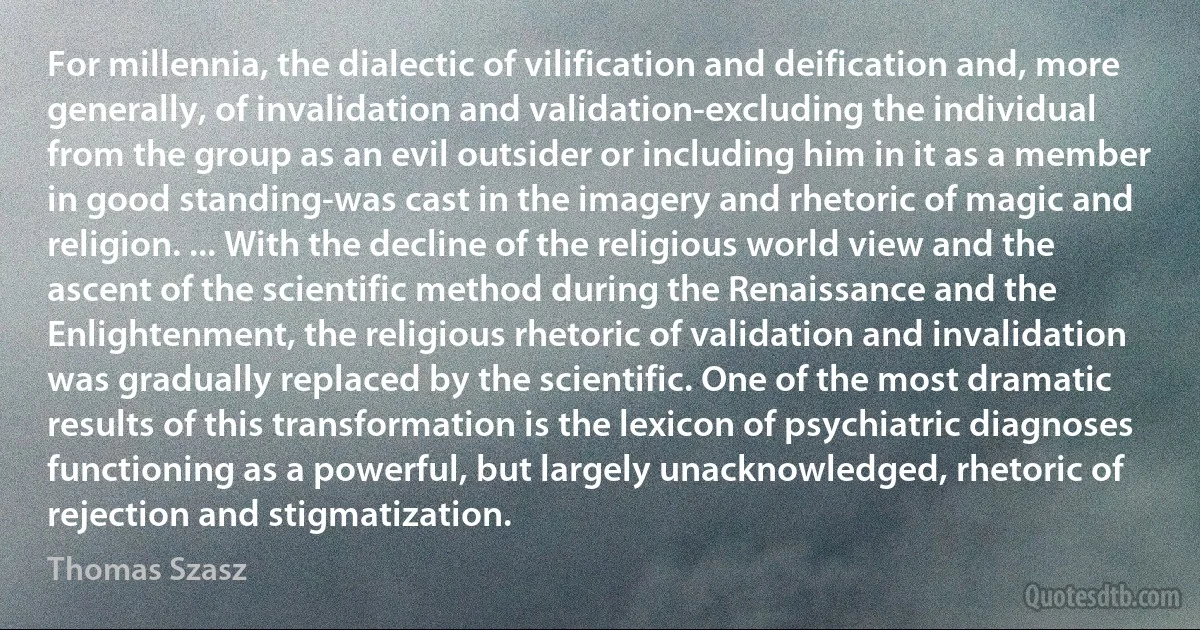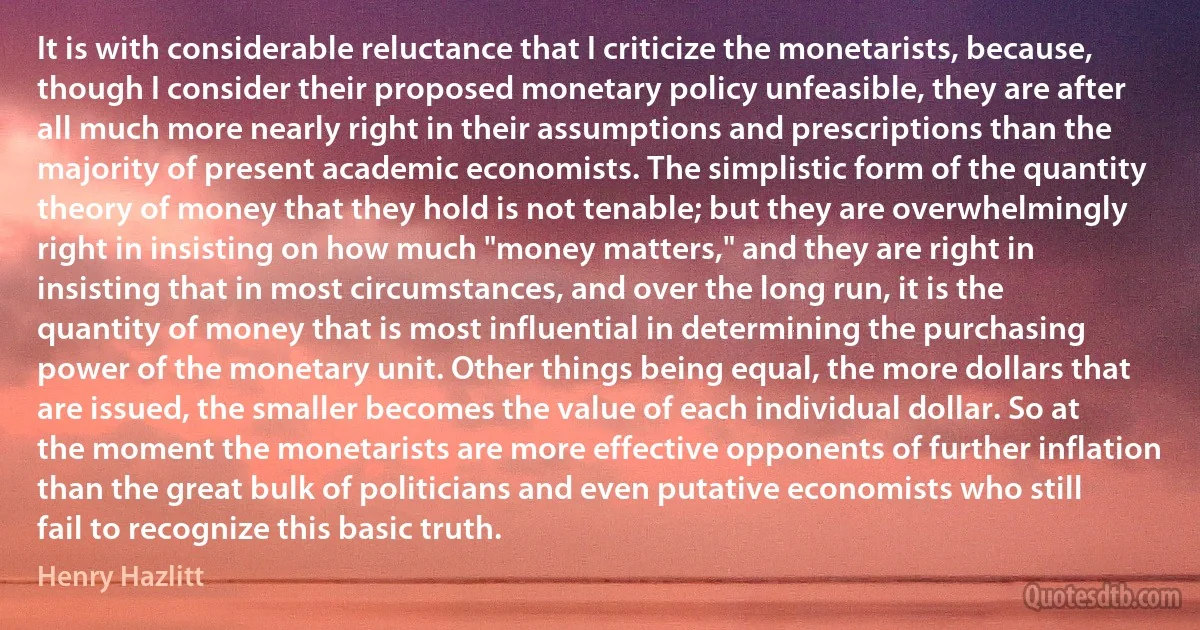Individual Quotes - page 79
A Roman emperor sitting at the table surrounded by his bodyguard is a magnificent sight, but when the reason is fear, the magnificence pales. So also when the individual does not dare stand taciturnly by his word, does not stand freely and confidently on the pedestal of a conscious act, but is surrounded by a host of deliberations before and after that render him incapable of getting his eye on the action.

Søren Kierkegaard
Is there anything we cannot contrive to call the demands of the times, and is there anything that does not acquire a certain prestige by being the demand of the times? But for decisive religious categories to become the demand for the times is eo ipso a contradiction. "The times” is too abstract a category to be able as claimant to demand the decisive religious categories that belong specifically to individuality and particularity; loud collective demands en mass for what can be shared only by the single individual in particularity, in solitariness, in silence, cannot be made.

Søren Kierkegaard
The host of specifically religious suggestions and images, in a story that until now has been devoid of such concern, suggests very strongly that Peake is here referring to the Christian religion as a debasing influence. Peake's treatment of Gormenghast's ritual shows that he dislikes any system of values imposed on the individual from outside, offering him nothing directly relevant for himself and encouraging him in whatever weakness he possesses. So, here, the Lamb can break down but not build; despite his worshipper's praise, he does not really understand how to keep his creatures alive. Still the Lamb glories in his power. True, in changing men he has destroyed them, denying them freedom to develop for themselves; to the Lamb, however, that is incidental to his own gratification.

Mervyn Peake
Complete ignorance with regard to certain matters is perhaps the best thing for children; but let them learn very early what it is impossible to conceal from them permanently. Either their curiosity must never be aroused, or it must be satisfied before the age when it becomes a source of danger. Your conduct towards your pupil in this respect depends greatly on his individual circumstances, the society in which he moves, the position in which he may find himself, etc. Nothing must be left to chance; and if you are not sure of keeping him in ignorance of the difference between the sexes till he is sixteen, take care you teach him before he is ten.

Jean-Jacques Rousseau
An important consequence of the unique interaction between internal and external forces ... is that knowledge of genetic differences contains no information at all about whether a characteristic can be changed by environmental and social arrangements. The most elementary error about genetics and development is to suppose that "genetic” is the opposite of "changeable” and that an answer to the question "how much can a trait be changed by social, historical, and individual circumstances” is given by an answer to the question "how important are genes.”.

Richard Lewontin
Genetics is the study of similarity between relatives, and the problem of human genetics is that, in a species with a family and social structure and a taboo against manipulating individual life histories experimentally, there is a confounding between the similarity of relatives that arises from biological causes and the similarity that arise from social causes.

Richard Lewontin
Today, America would be outraged if U.N. troops entered Los Angeles to restore order. Tomorrow they will be grateful! This is especially true if they were told that there were an outside threat from beyond, whether real or promulgated, that threatened our very existence. It is then that all peoples of the world will plead to deliver them from this evil. The one thing every man fears is the unknown. When presented with this scenario, individual rights will be willingly relinquished for the guarantee of their well-being granted to them by the World Government.

Henry Kissinger
This connection, at once semantic and conceptual, between unorthodoxy and sodomy, was firmly established during the late Middle Ages, and has never been severed. It is as strong today as it was six hundred years ago. To be stigmatized as a heretic or bugger in the fourteenth century was to cast out of society. Since the dominant ideology was theological, religious deviance was considered so grave an offense as to render the individual a nonperson. Whatever redeeming qualities he might have had counted for naught. The sin of heresy eclipsed all contradictory, personal characteristics, just as the teachings of God and the Church eclipsed all contradictory empirical observations. The disease called "mental illness”-and its subspecies "homosexuality”-plays the same role today.

Thomas Szasz
In 1948 the Democrats had little choice but to nominate President Truman, under the banner HE'S GOING TO LOSE. Everybody felt this way: the politicians, the press, the pollsters, the piccolo players, Peter Piper, everybody. The Republicans were so confident that they nominated an individual named Thomas Dewey, whose lone accomplishment was inventing the decimal system. Truman campaigned doggedly around the nation, but his cause appeared to be hopeless. A Dewey victory seemed so inevitable that on election night, the Chicago Tribune printed the famous front-page headline DEWEY DEFEATS TRUMAN. This was because Dewey had defeated Truman, who immediately threatened to drop an atomic bomb on Chicago, so everybody went ha-ha-ha-ha, just kidding, and wisely elected to have the feisty ex-haberdasher have another term.

Dave Barry
...the real origin and essence of the hypnotic condition, is the induction of a habit of abstraction or mental concentration, in which, as in reverie or spontaneous abstraction, the powers of the mind are so much engrossed with a single idea or train of thought, as, for the nonce, to render the individual unconscious of, or indifferently conscious to, all other ideas, impressions, or trains of thought. The hypnotic sleep, therefore, is the very antithesis or opposite mental and physical condition to that which precedes and accompanies common sleep...

James Braid
All that produces a strong excitation, all that modifies the preliminary state of the thoughts and the feelings, surely also modifies the mental and physical state of the individual, especially if it occurs with confidence, expectation, and concentration of mind. All these phenomena, however extraordinary they are, are only the result of a heightening of the intellectual functions or power, which we all have to an average degree in the ordinary or waking state.

James Braid
In a culture whose media extols thinness as the great panacea that will bring happiness, sexuality, self-respect and social acceptance, they are blind to the insidious lies of the false goddess. Possessed by their own damaged instincts, and ironically driven by the same desire for power that their parents used in raising them, some children wolf down food, or reject it, or vomit it out. Whether that rejection of life is concretized in 200 pounds of armor, or 90 pounds of bone, or vomit in the toilet, the surest way out of the neurosis is to try to understand what food symbolizes in the individual psyche and why the energy is pulled in that direction.

Marion Woodman
...the position of the body significantly influences the emotions and sensations during the desired stage of hypnotism; also, whatever the passion which one wants to express by the attitude of the patient, when the muscles necessary to this expression are brought into play, the passion itself bursts forth suddenly and the whole organism responds accordingly. The upright body, the expanded chest, the contracted extensors, all that suggests the feeling of self-esteem, self-determination, resolve and unconquerable pride. As soon as one decreases the contraction of these muscles, that gives to the patient a depressed attitude, with a sunken chest, the expression of the features changes in a very manifest way, the voice and the whole manner of being of the individual now express humility, abasement and pity.

James Braid
The Irishman, finding himself in another environment, outside Ireland, very often knows how to make his worth felt. The economic and intellectual conditions of his homeland do not permit the individual to develop. The spirit of the country has been weakened by centuries of useless struggle and broken treaties. Individual initiative has been paralyzed by the influence and admonitions of the church, while the body has been shackled by peelers, duty officers and soldiers. No self-respecting person wants to stay in Ireland. Instead he will run from it, as if from a country that has been subjected to a visitation by an angry Jove.

James Joyce
I felt it necessary to evolve entirely new concepts (of form and space and paintings) and postulate them in an instrument that could continue to shake itself free from dialectical perversions. The dominant ones, Cubism and Expressionism, only reflected the attitudes of power or spiritual debasement of the individual.

Clyfford Still
Painting and sculpture are very archaic forms. It's the only thing left in our industrial society where an individual alone can make something with not just his own hands, but brains, imagination, heart maybe. It's a very archaic form. Same things can be said with words, writing poetry, making sounds, music. It is a unique thing.... I think that the original revolutionary impulse behind the New York School, as I felt it anyway, and as I think my colleagues felt and the way we talked all the time, was a kind of a.... you felt as if you were driven into a corner against the wall, with no place to stand, just the place you occupied as if the act of painting was not making a picture.... it was as if you had to prove to yourself that truly the act of creation was still possible.... I felt as if I was talking to myself, having a dialectical monologue with myself to see if I could create.

Phillip Guston



